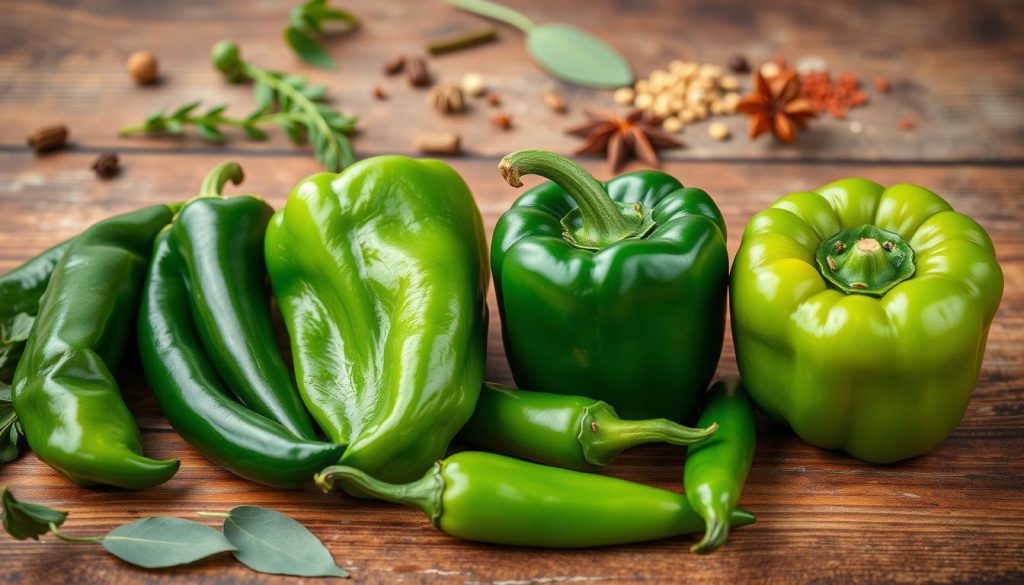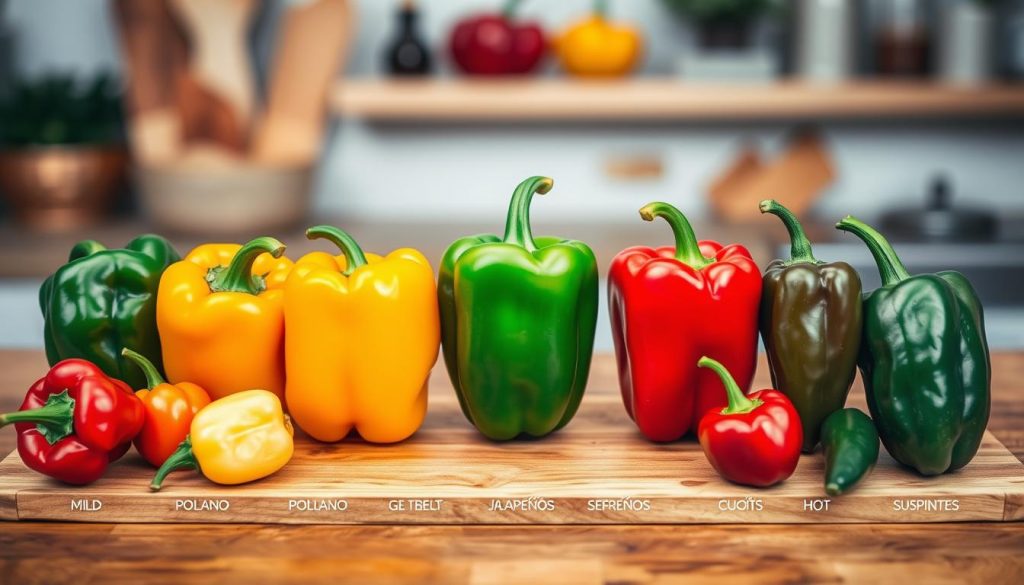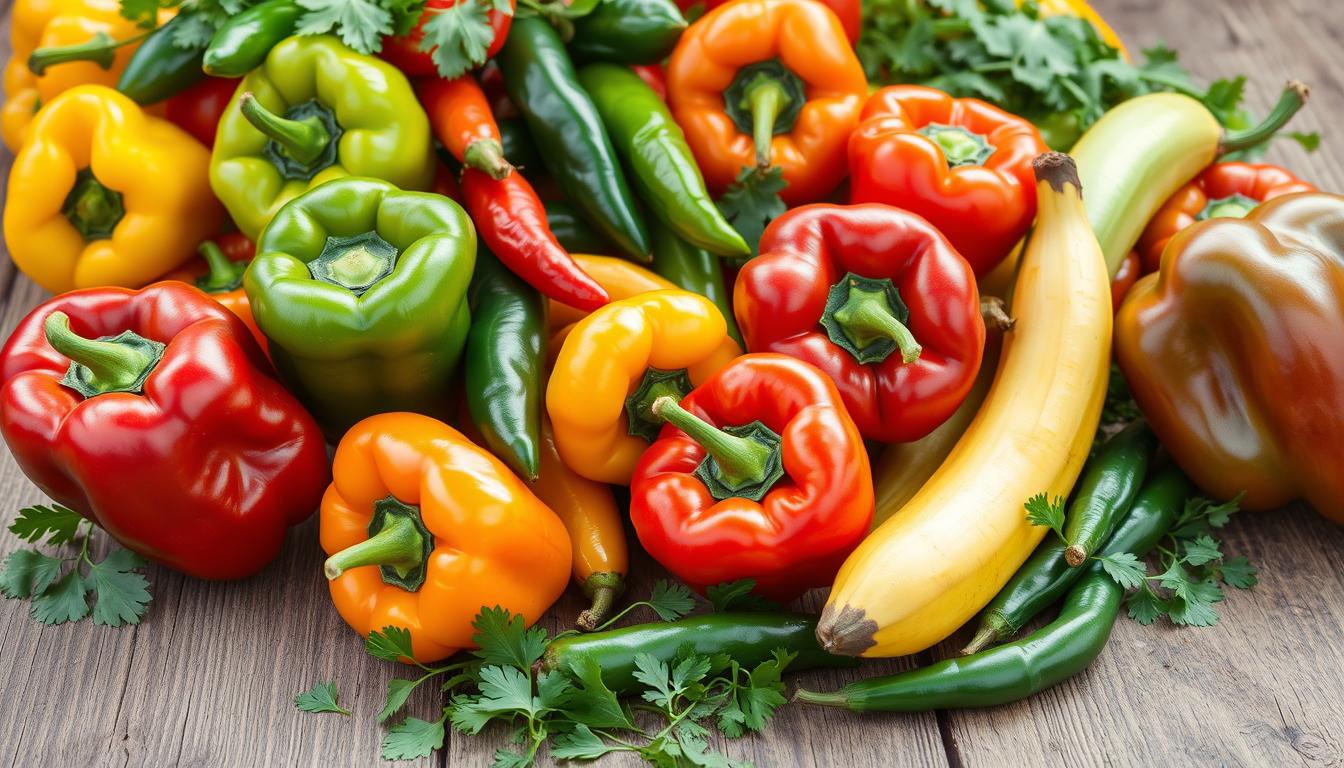Poblano peppers are known for their mild heat and unique taste. They are a favorite in many dishes, especially in Mexican cuisine like chili rellenos. But sometimes, you might need to find other peppers to use instead.
This could be because the poblanos are not available or you want to try something different. Knowing your options is key to keeping your dishes flavorful. This guide will help you find the best substitutes for poblano peppers. You’ll learn how to keep your recipes delicious, even without poblanos.
Understanding Poblano Peppers
Poblano peppers come from the poblano peppers origin in Mexico’s Puebla region. They are known for their thick walls and mild, earthy taste. This makes them great for many dishes, with a heat level of 1,000 to 2,000 Scoville units.
They are perfect for family meals because they are not too spicy. This is compared to other chilies.
Origin and Characteristics
The poblano peppers origin is in Mexico, where they are loved in many dishes. They are about 4 inches long and have a bell-like shape. Their smooth skin and shiny look show they are fresh.
Choose peppers that are heavy and dense for the best results. Poblanos have a heat level of about 1,250 SHU. This is milder than jalapeños but hotter than green bell peppers.
Culinary Uses
Poblano peppers are used in many ways, from classic dishes to new recipes. They are often used in chiles rellenos, stuffed with cheese or meat. Roasting them brings out their sweet flavor.
They also go well with garlic, cumin, and lime. This makes them great for salsas and sauces. Their flexibility lets them be used raw or cooked in many dishes.
Fresh poblano peppers can be stored in the fridge for six to seven days. Roasted and peeled ones last two to three days in airtight containers. Freezing them can keep them good for up to 12 months. This way, you can enjoy their taste all year.
| Type of Pepper | Heat Level (SHU) | Characteristics | Culinary Uses |
|---|---|---|---|
| Poblano | 1,000 – 2,000 | Mild, earthy flavor, thick walls | Stuffed dishes, roasted, salsas |
| Anaheim | 500 – 2,500 | Slightly higher heat | Similar applications, spicier substitute |
| Cubanelle | 100 – 1,000 | Very mild | Salads, stuffing, frying |
| Ancho (dried Poblano) | 1,000 – 2,000 | Smokier, richer flavor | Mole sauces, chili blends |
Importance of Finding a Sub for Poblano Peppers Guide
Finding substitutes for poblano peppers is key in many cooking situations. It’s helpful when you can’t find them at the store or need to fit dietary needs. Knowing how to pick substitutes helps keep your dishes tasting right.
When to Consider Substitutes
Use substitutes if you can’t find poblano peppers or if a recipe needs a milder pepper. Peppers like cubanelle are good for mild dishes, like scrambled eggs. Think about what you like and what the recipe needs when choosing substitutes.
Impact on Flavor and Recipe
Substitutes can change how a dish tastes. Peppers like guajillo and jalapeño have different heat and sweetness levels. Poblanos are milder, ranging from 1,000 to 2,000 Scoville units. Jalapeños can be up to 8,000 units. Knowing these differences helps you pick the right substitutes for the taste and heat you want.
Top Substitutes for Poblano Peppers
Looking for the best substitutes for poblano peppers? There are many options that can meet your cooking needs. Each one has its own flavor and heat level, which can make your dishes even better. Let’s explore some top poblano pepper alternatives:
Anaheim Peppers
Anaheim peppers are a close match for poblanos. They taste similar but can be a bit hotter, with heat levels from 500 to 2,500 Scoville units. Great for stuffing, grilling, or adding to salsas, Anaheim peppers are versatile and easy to find.
Cubanelle Peppers
Cubanelle peppers are a mild choice for poblano lovers. They are much milder, up to ten times, and sweet. Perfect for stir-fries, salads, or as fresh toppings, they add flavor without the heat.
Bell Peppers
Bell peppers are a common substitute. They have a mild taste and almost no heat. Ideal for cooking for kids or those who don’t like spice, they can replace poblanos in many recipes. However, they don’t have the unique spice of poblanos.
Jalapeño Peppers
Jalapeño peppers offer a spicy kick. With heat from 2,500 to 8,000 Scoville units, they add a noticeable spiciness. Great in salsas, sauces, and Mexican dishes, they bring heat to your meals.
Guajillo Peppers
Guajillo peppers are another great choice. They have a smoky flavor and moderate heat, similar to jalapeños. Their unique taste adds depth to stews, marinades, and sauces, making them a standout ingredient.

Flavor Profiles and Heat Levels
It’s important to know the heat and flavor of poblano pepper substitutes. This helps pick the right ingredient for your dish. By substituting wisely, you can make your food taste better and keep flavors balanced. Here’s a comparison of peppers’ heat and their unique tastes.
Comparing Heat Levels
Poblano peppers have a heat of 1,000 to 1,500 Scoville units. This makes them mild to medium hot. They’re great for many dishes without being too spicy. Here’s a list of common substitutes and their heat levels:
| Pepper Type | Scoville Heat Units (SHU) | Heat Classification |
|---|---|---|
| Poblano | 1,000 – 1,500 | Mild to Medium |
| Anahiem | 500 – 2,500 | Mild |
| Guajillo | 5,000 – 8,000 | Medium |
| Jalapeño | 2,500 – 8,000 | Medium |
| Serrano | 10,000 – 23,000 | Medium |
| Habanero | 100,000 – 350,000 | Extra Hot |

Flavor Considerations
It’s also key to think about the flavor of substitutes. Poblano peppers have a rich, earthy taste. They add depth to dishes, especially in Mexican recipes. Other peppers bring different tastes:
- Anahiem peppers are mild and sweet, making them versatile.
- Guajillo peppers add a fruity sweetness to sauces and stews.
- Jalapeño peppers bring a bright, grassy flavor with their heat.
When substituting, adjust amounts based on heat to keep flavors right. Knowing about pepper heat helps make meals balanced and tasty.
Practical Tips for Substituting
Knowing how to use substitutes in cooking can change the game. Learning to replace poblano peppers can make your cooking better. Here are some tips to keep your dishes tasty and balanced.
How to Use Substitutes in Cooking
Choosing pepper substitutes needs careful thought about their heat and taste. Here are some strategies:
- Adjust Quantities: Peppers vary in heat. For example, jalapeños are hotter than poblanos. You might use less of them.
- Consider Preparation Methods: Roasting or grilling can make peppers sweeter. Bell peppers, for instance, can be caramelized for depth.
- Taste as You Go: Taste your dish as you cook. This is especially true for hot peppers like habañeros.
Adjusting Recipes with Substitutes
Changing recipes for substitutes means balancing flavors and textures. Here’s how to replace poblanos:
- Compensate for Heat: If using a spicy pepper like serrano, add something sweet. Honey or sugar can help.
- Account for Moisture: Peppers have different moisture levels. You might need to adjust liquids if using drier peppers.
- Enhance Flavor Combinations: Use spices and acids to match your substitute’s flavor. Lime juice can brighten dishes with smoky peppers.
| Pepper Type | Spice Level (SHU) | Best Used With |
|---|---|---|
| Bell Pepper | 0 | Salads, Stir-fries |
| Cubanelle Pepper | 500 | Sautéing, Dishes needing mild heat |
| Anaheim Pepper | 1,000-2,500 | Tacos, Salsas |
| Jalapeño Pepper | 2,500-8,000 | Hot sauces, Marinades |
| Serrano Pepper | 10,000-23,000 | Fresh salsas, Dishes needing a kick |
| Cayenne Pepper | 30,000-50,000 | Spicy seasoning, Sauces |
Mastering pepper substitutes lets you experiment safely. Follow these tips to confidently make substitutions and enjoy your cooking.
Conclusion
When looking for poblano substitutes, remember that they can change your dish’s taste and heat. But they can also bring new flavors to your cooking. Try using Anaheim, Cubanelle, or Jalapeño peppers to discover new tastes.
Each substitute has its own special qualities. This lets you get creative in the kitchen. It’s a fun way to explore new flavors.
Using these alternatives well is important. It helps keep your dishes true to their original taste. For example, Bell peppers add sweetness and crunch, while Guajillo peppers bring complex flavors.
This variety keeps your cooking exciting and tasty, even without poblanos. It makes sure your meals stay vibrant and enjoyable.
Thinking about poblano alternatives is a chance to try many different peppers. Whether you’re making a spicy salsa or a cozy stuffed pepper dish, adjusting your recipes can lead to great results. By being open to trying new things, you can make your meals even better and enjoy the creative process.
Source Links
- https://cookscrafter.com/poblano-pepper-substitutes/
- https://www.cozymeal.com/magazine/jalapeno-substitute
- https://thekitchencommunity.org/substitutes-for-poblano-peppers/
- https://pepperscale.com/poblano-pepper-substitute/
- https://pepperscale.com/poblano-peppers/
- https://brokebankvegan.com/poblano-peppers/
- https://www.spiceandlife.com/poblano-pepper-substitute/
- https://gustomeadow.com/poblano-pepper-substitutes/
- https://www.cozymeal.com/magazine/pasilla-pepper
- https://www.chefspencil.com/poblano-pepper-substitutes/
- https://www.holisticwow.com/peppers/poblano/
- https://www.forksoverknives.com/how-tos/cooks-guide-to-fresh-chile-peppers/
- https://spicesinc.com/blogs/guide-mexican-dried-chiles?srsltid=AfmBOornOifgQNvhUEFkGLpU5qP9ENLt4C8nk9AWNflMdrRL-pLBe24f
- https://peasandhoppiness.com/blog/pepper-picking-guide/
- https://86lemons.com/substitutes-for-poblano-pepper/
- https://casadesante.com/blogs/wellness/anaheim-pepper-substitutes?srsltid=AfmBOoo3IpPO8wyknUBOsLzEMU9f1Akm-WleHLwA_qyqFlXCu2adyTRh
- https://www.alsothecrumbsplease.com/anaheim-pepper-substitute/
